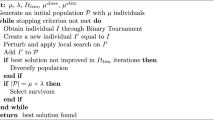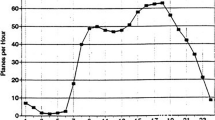Abstract
We study the problem of non-preemptively scheduling n independent sequential jobs on a system of m identical parallel machines in the presence of reservations, where m is constant. This setting is practically relevant because for various reasons, some machines may not be available during specified time intervals. The objective is to minimize the makespan C max, which is the maximum completion time.
The general case of the problem is inapproximable unless \(\mathsf {P}=\mathsf {NP}\) ; hence, we study a suitable strongly \(\mathsf {NP}\) -hard restriction, namely the case where at least one machine is always available. For this setting we contribute approximation schemes, complemented by inapproximability results. The approach is based on algorithms for multiple subset sum problems; our technique yields a PTAS which is best possible in the sense that an FPTAS is ruled out unless \(\mathsf {P}=\mathsf {NP}\) . The PTAS presented here is the first one for the problem under consideration; so far, not even for well-known special cases approximation schemes have been proposed. Furthermore we derive a low cost algorithm with a constant approximation ratio and discuss FPTASes for special cases as well as the complexity of the problem if m is part of the input.
Similar content being viewed by others
References
Caprara, A., Kellerer, H., Pferschy, U.: The multiple subset sum problem. SIAM J. Optim. 11, 308–319 (2000)
Caprara, A., Kellerer, H., Pferschy, U.: A PTAS for the multiple subset sum problem with different knapsack capacities. Inf. Process. Lett. 73(3–4), 111–118 (2000)
Caprara, A., Kellerer, H., Pferschy, U.: A 3/4-approximation algorithm for multiple subset sum. J. Heuristics 9(2), 99–111 (2003)
Chekuri, C., Khanna, S.: A polynomial time approximation scheme for the multiple knapsack problem. SIAM J. Comput. 35(3), 713–728 (2005)
Dawande, M., Kalagnanam, J., Keskinocak, P., Salman, F.S., Ravi, R.: Approximation algorithms for the multiple knapsack problem with assignment restrictions. J. Comb. Optim. 4(2), 171–186 (2000)
Eyraud-Dubois, L., Mounié, G., Trystram, D.: Analysis of scheduling algorithms with reservations. In: IPDPS, pp. 1–8. IEEE, New York (2007)
Garey, M.R., Johnson, D.S.: Computers and Intractability: A Guide to the Theory of NP-Completeness. Freeman, New York (1979)
Hochbaum, D.S., Shmoys, D.B.: Using dual approximation algorithms for scheduling problems: theoretical and practical results. J. ACM 34(1), 144–162 (1987)
Hochbaum, D.S., Shmoys, D.B.: A polynomial approximation scheme for scheduling on uniform processors: Using the dual approximation approach. SIAM J. Comput. 17(3), 539–551 (1988)
Hwang, H.-C., Lee, K., Chang, S.Y.: The effect of machine availability on the worst-case performance of LPT. Discrete Appl. Math. 148(1), 49–61 (2005)
Ibarra, O.H., Kim, C.E.: Fast approximation algorithms for the knapsack and sum of subset problems. J. ACM 22(4), 463–468 (1975)
Kellerer, H.: A polynomial time approximation scheme for the multiple knapsack problem. In: Hochbaum, D.S., Jansen, K., Rolim, J.D.P. (eds.) RANDOM-APPROX. Lecture Notes in Computer Science, vol. 1671, pp. 51–62. Springer, Berlin (1999)
Kellerer, H., Mansini, R., Pferschy, U., Speranza, M.G.: An efficient fully polynomial approximation scheme for the subset-sum problem. J. Comput. Syst. Sci. 66(2), 349–370 (2003)
Kellerer, H., Pferschy, U.: A new fully polynomial time approximation scheme for the knapsack problem. J. Comb. Optim. 3(1), 59–71 (1999)
Kellerer, H., Pferschy, U., Pisinger, D.: Knapsack Problems. Springer, Berlin (2004)
Lawler, E.L.: Fast approximation algorithms for knapsack problems. Math. Oper. Res. 4(4), 339–356 (1979)
Lee, C.-Y.: Parallel machines scheduling with non-simultaneous machine available time. Discrete Appl. Math. 30, 53–61 (1991)
Lee, C.-Y.: Machine scheduling with an availability constraint. J. Glob. Optim. 9, 363–384 (1996), Special Issue on Optimization of Scheduling Applications
Lee, C.-Y., He, Y., Tang, G.: A note on “parallel machine scheduling with non-simultaneous machine available time. Discrete Appl. Math. 100(1–2), 133–135 (2000)
Leung, J.Y.-T. (ed.): Handbook of Scheduling. Chapman & Hall, London (2004)
Liao, C.-J., Shyur, D.-L., Lin, C.-H.: Makespan minimization for two parallel machines with an availability constraint. Eur. J. Oper. Res. 160, 445–456 (2003)
Liao, L.-W., Sheen, G.-J.: Parallel machine scheduling with machine availability and eligibility constraints. Eur. J. Oper. Res. 184, 458–467 (2008)
Martello, S., Toth, P.: Knapsack Problems: Algorithms and Computer Implementations. Wiley, New York (1990)
Sahni, S.: Algorithms for scheduling independent tasks. J. ACM 23(1), 116–127 (1976)
Scharbrodt, M., Steger, A., Weisser, H.: Approximability of scheduling with fixed jobs. J. Sched. 2, 267–284 (1999)
Woeginger, G.J.: When does a dynamic programming formulation guarantee the existence of a fully polynomial time approximation scheme (FPTAS)?. INFORMS J. Comput. 12(1), 57–74 (2000)
Author information
Authors and Affiliations
Corresponding author
Additional information
An extended abstract of this work has been accepted at the 14th International Conference on High Performance Computing, HiPC 2007, Goa, India, December 18–21, 2007.
F. Diedrich’s research was supported in part by a grant “DAAD Doktorandenstipendium” of the German Academic Exchange Service and in part by EU research project AEOLUS, Algorithmic Principles for Building Efficient Overlay Computers, EU contract number 015964. Part of this work done while visiting the LIG, Grenoble University. Supported in part by DFG priority program 1126, “Algorithmics of Large and Complex Networks”; furthermore supported in part by a PPP funding “Scheduling in Communication Networks” D/05/06936 granted by the DAAD.
K. Jansen is supported in part by DFG priority program 1126, “Algorithmics of Large and Complex Networks” and in part by EU research project AEOLUS, Algorithmic Principles for Building Efficient Overlay Computers, EU contract number 015964.
Part of D. Trystram’s work was supported by the “CoreGRID” Network of Excellence.
Rights and permissions
About this article
Cite this article
Diedrich, F., Jansen, K., Pascual, F. et al. Approximation Algorithms for Scheduling with Reservations. Algorithmica 58, 391–404 (2010). https://doi.org/10.1007/s00453-008-9271-2
Received:
Accepted:
Published:
Issue Date:
DOI: https://doi.org/10.1007/s00453-008-9271-2




